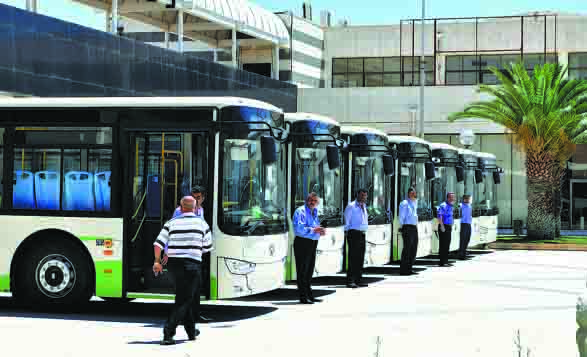Connections with Arab region gathering pace


When President Xi Jinping made his headline-grabbing trip to Saudi Arabia in December, the visit was not only about reinvigorating China's ties with the country and the wider Arab region, but also it was about how other countries would stand to benefit from the upgraded relations between the two sides.
Xi arrived in Riyadh to attend the first China-Arab States Summit and the China-Gulf Cooperation Council Summit and paid a state visit to Saudi Arabia from Dec 7 to 10. There, he called for strengthening their synergies between development strategies and promoting high-quality Belt and Road Initiative cooperation, a mega-infrastructure vision that he launched in 2013.
Umer Karim, an associate fellow at the King Faisal Center for Research and Islamic Studies in Riyadh, told China Daily that since Saudi Arabia "is situated on the crossroads of Asia, Africa and the Mediterranean", any development in the country remained vital for China's BRI projects traversing the three regions.
To date, China's gravitation toward Riyadh has now gone beyond talk and diplomatic optics.
Karim said that the recent Chinese engagement with the Arab world in Riyadh "managed to hit three targets in one go". Apart from the Saudi-China meeting, he cited China's "strategic" meeting with the Arab world, and the summit between Gulf Cooperation Council states.
"Connecting with the leadership of the wider Arab world within the heart of Arab politics, Riyadh will eventually translate into further strengthening bonds of political trust between the two sides and further economic cooperation mainly through BRI-related investments and infrastructure development mainly across northern Africa," said Karim.
There were 17 cooperation mechanisms under the framework of the China-Arab States Cooperation Forum. Over the past decade, trade had grown by $100 billion with the total volume exceeding $300 billion, and over 200 Belt and Road projects have been carried out, benefiting nearly 2 billion people.
Karim said the GCC countries-Bahrain, United Arab Emirates, Qatar, Oman, Saudi Arabia, and Kuwait — were already engaged in fields like energy, maritime trade and smart technologies. Some Chinese firms in the United Arab Emirates, he said, may be interested in connecting their BRI ventures in East Africa with GCC states, for example.
In the study titled "China's Belt and Road Initiative and Saudi Vision 2030: A Review of the Partnership for Sustainability" by the Riyadh-based think tank King Abdullah Petroleum Studies and Research Center in May 2021, it said that new opportunities for Sino-Saudi cooperation were emerging as climate action had become more important for global economic growth.
Significant steps
In 2020, both countries took significant steps to combat carbon emissions as Saudi Arabia proposed a circular carbon economy framework to promote sustainable growth within the carbon management loop at the G20 summit while China pledged to achieve carbon neutrality before 2060.
The study concluded that Saudi Arabia and China can work together to create a carbon circular economy framework within the BRI.
It said the promotion may include, for example, considering the provision of hydrogen during investment and financing planning for BRI-related ports, highways and railway projects, adding that it can support regional power integration, especially in the GCC, the Association of Southeast Asian Nations and Africa.
Mehmet Rakipoglu, a Gulf analyst and researcher at Sakarya University Middle East Institute in Turkiye, considers the BRI a "complementary project" to the GCC's national strategies.
A case in point is Saudi Arabia's Vision 2030, an economic blueprint unveiled in 2016 by Crown Prince and Prime Minister Mohammed bin Salman Al Saud, to diversify his nation's reliance on oil.
"As all the world witnessed during President Xi's visit (in Riyadh), there were plenty of agreements signed for advancing the mutual cooperation," Rakipoglu told China Daily.
In Riyadh, Xi and Saudi King Salman bin Abdulaziz Al Saud co-signed an agreement on the comprehensive strategic partnership. Saudi and Chinese companies signed more than 30 investment agreements, Saudi Press Agency reported.
Greater interest expected
"It should be expected that we would see a greater Saudi interest in BRI flagship projects in countries around the kingdom. Saudi Arabia already had expressed in joining the China-Pakistan Economic Corridor. So, we may see a renewed Saudi interest in that venture," said Karim.
The CPEC, a BRI flagship project itself, is a framework of regional connectivity that is seen to also benefit Iran, Afghanistan, and the Central Asian region.
A report by China Three Gorges South Asia Investment Ltd revealed that 27 projects worth $19 billion so far have been completed. At least 63 more projects with investments of $35.2 billion are scheduled to be completed by 2030.
All of this shows that for China, the wider Arab world, but particularly Saudi Arabia, "is becoming critical for BRI projects progression and cross-regional connectivity", Karim said.
Rakipoglu from Turkiye said that with Saudi Arabia wanting to diversify its economy and Riyadh targeting to increase its non-oil trade, by joining the China-Pakistan corridor, it will be able to have more trade partners.
According to a report by Arab News in December, Naif Al-Ghaith, chief economist at Riyad Bank, was quoted as saying that the Saudi economy continued its expansion in the non-oil sector in November as business conditions have improved across the board amid rising demand.
Further, Al-Ghaith said that output levels in the kingdom's non-oil sector have expanded at the fastest rate in seven years and that improved business expectations were also observed as a result of the execution of Vision 2030 initiatives.
Ebrahim Hashem, AsiaGlobal Fellow at the Hong Kong-based Asia Global Institute, believes that there will be more momentum behind the BRI as Chinese borders reopen and both sides deepen their partnerships in all fields, particularly energy, technology, trade, infrastructure and security.
He said that as both sides are planning to harmonize their strategies, there will be better alignment between China and Saudi Arabia, adding more impetus and strategic force behind the projects being implemented jointly within the BRI framework.

































